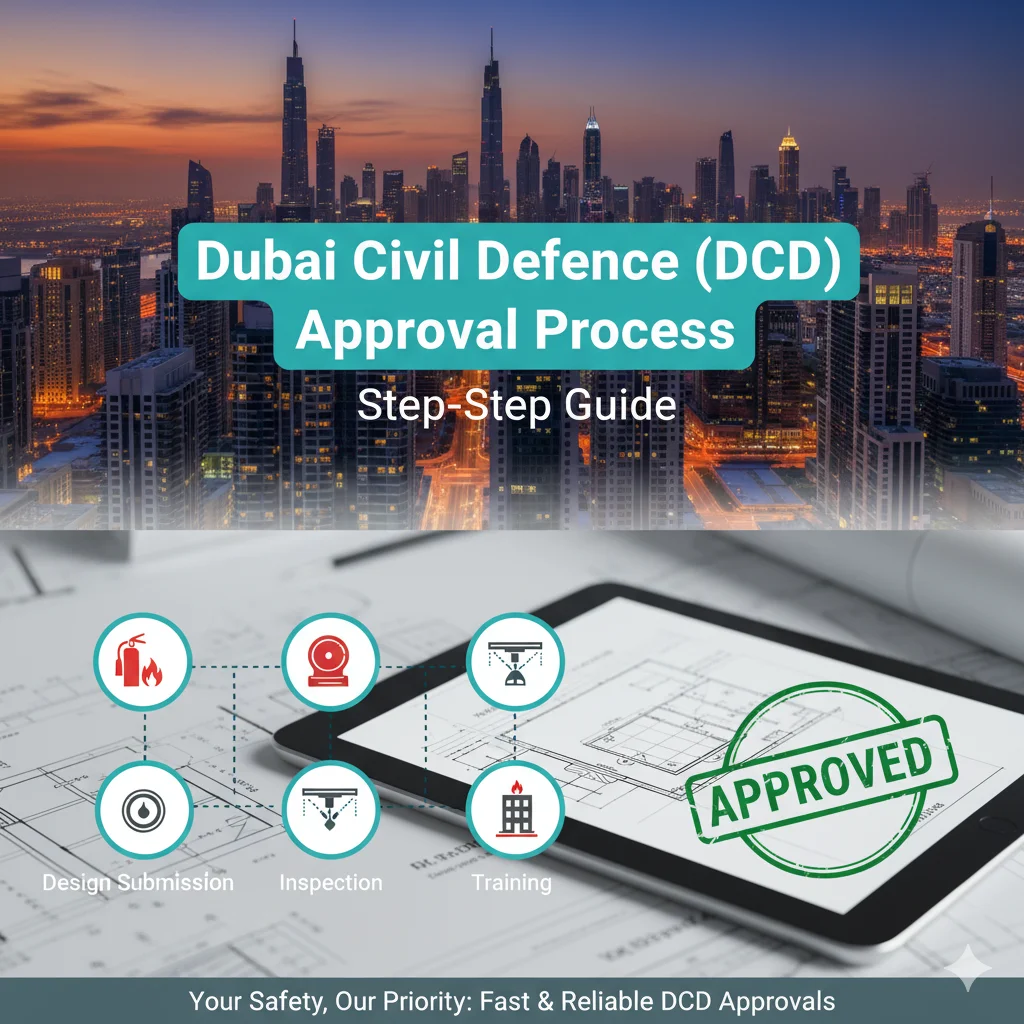Dubai Hospitals and health centers require more attention when it comes to DCD approvals, fire safety, evacuation and rescue operations due to the presence of patients.
The question here is:How does Civil Defense handle the situation when patients, chemicals, and compressed oxygen are present? And what requirements does DCD need to prevent that?
In this article, we explain the DCD approval process for Dubai schools and universities and the required documents, and Dubai civil defence standards in healthcare facilities.
Table of Contents
Why is DCD Approval Mandatory for Dubai healthcare facilities?
Dubai civil defence compliance is mandatory for healthcare facilities to save patients’ lives and prevent fire accidents. Moreover, it is legal mandate for operations and licensing. Also, they save properties and avoid financial losses.
1- save patients’ lives and ensure they can evacuate safely with the help of trained employees.
2- Prevent Fire Accidents & Minimize Hazards
3- Legal Mandate for Operation & Licensing
4- Save Property & Avoid Financial Losses
Documents Required for DCD Approval for healthcare facilities
Healthcare facilities need medical gas system layout and fire training certificates in addition to the DCD required documents.
Also, they need extra documents that are listed below:
- Architectural Floor and fire alarm system Plans
- HVAC and Smoke Control System Plans
- Medical Gas System Layout (especially oxygen lines and storage)
- Civil Defence Affection Plan (site plan)
- Consultant and Contractor Trade Licenses (DCD-registered)
- Title Deed or Tenancy Agreement
- Dubai Municipality and/or DHA Approvals (if necessary)
- As-built drawings
- Installation & Testing Reports (fire pumps, alarms, extinguishers)
- Fire and Life Safety Compliance Declaration
- Fire Training Certificates (at least 10% of staff)
- Emergency Evacuation Plan
Dubai Civil Defence Standards in Healthcare Facilities
Dubai Civil Defence (DCD) enforces strict fire and life safety standards on healthcare facilities to protect people’s lives and especially patients who can not evacuate immediately in case of fire.
Some of the DCD standards are advanced fire protection systems and exceptional rules for sensitive areas. add to this, the emergency preparedness and periodic inspections of fire safety equipment.
1- Advanced fire protection systems
Health care facilities should have different fire protection systems installed for their purposes such as sprinkler systems, standpipe systems, clean agent systems and foam systems.
- Sprinkler Systems: Dry and active systems to control or suppress fires.
- Standpipe and Hose Reel Systems: To be used during manual firefighting operations.
- Clean Agent Systems: To be utilized in rooms that have sensitive equipment because they suppress the fire only and not the electronics.
- Deluge and Foam Systems: For high-hazard locations where immediate suppression of the fire is required.
2- Exceptional rules for sensitive areas
Certain areas within healthcare facilities, such as record rooms and intensive care units require special fire protection equipment.
For instance, pre-action sprinkler systems are often used in these areas to prevent accidental water discharge, which could be detrimental to sensitive equipment and ongoing medical procedures.
all the fire system equipment must follow the fire and life safety code and the DCD should make annual maintenance to fix existed errors.
3- Emergency Preparedness and Evacuation Plans
Health facilities must have and maintain comprehensive emergency plans that entail:
- Staff Training: Frequent fire safety practice drills and training to make the staff prepared to respond appropriately.
- Clear Evacuation Routes: Carefully marked and clear routes to exits.
- Assembly Points: Safe locations for gathering after evacuation.
- Emergency Signage: Clear signs for identifying exits and positions of emergency equipment.
4- periodic Inspections
DCD demands periodical inspections of fire safety equipment at health centers, which check the installation and the appliance of the submitted drawings and documents.
The documents should comply with the UAE fire and life safety code; otherwise, the inspection process will fail, and you will have to resubmit your application.
The premises also have to maintain records of the checks and services carried out.
For more tips about the inspection process, read the top 10 tips for successful DCD inspection, which we gave valuable tips to pass the inspection successfully.
Case study: Aster hospital fire in Dubai
Case overview:
The Dubai civil defence managed to control a fire that happened at the Aster hospital due to a short circuit. The civil defense personnel arrived in just 6 minutes and controlled the fire within 10 minutes and evacuated the building to ensure the safety of people.
How did the DCD manage the incident?
1- immediate response. In just 6 minutes, the DCD arrived at the place and responded to the emergency call.
2- evacuation plan. The DCD did an evacuation process to the whole building as a preventive procedure to avoid any injuries.
3- effective fire safety system. Which is the most important thing when it comes to detecting a fire and alerting residents to evacuate.
Conclusion
Protecting patients, visitors, and the medical team is a responsibility for the Dubai civil defence and they do their job perfectly by ensuring the compliance with the UAE code, implementing evacuation drills and requiring DCD approvals.
The required documents from DCD are a green light to confirm the building is safe and prepared for any sudden fire.
Yes, Dubai Civil Defence approval needed for villa projects and residential constructions
Defective information, not following DCD drawing format, submitting irrelevant documents, poor document organization, ignoring fire and life safety code are common challenges of obtaining DCD.
The common mistakes are: Defective information, Not following DCD drawing submission format, Submitting, irrelevant DCD documents and Ignoring DCD fire and life safety code.
Yes, you need an annual maintenance contract (AMC) after getting approval to address any malfunction or issue.



Comments are closed